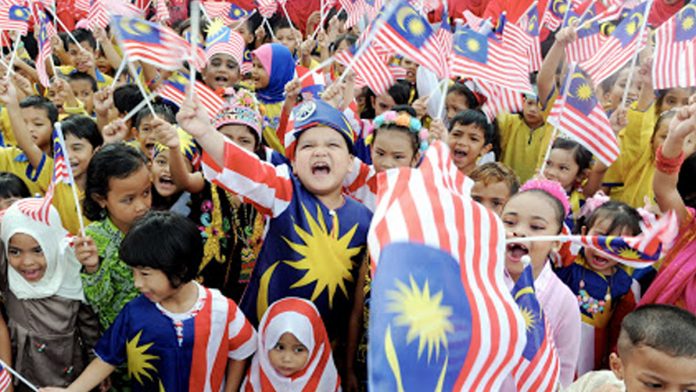KUALA LUMPUR – The Malay saying Genggam bara api, biar sampai jadi arang or its English equivalent “In for a penny, in for a pound” – which means when one embarks on doing something, one must see it right through to the end – is an appropriate phrase to describe unity and the role played by Malaysians.
As citizens of a multiracial nation, it is our responsibility to forever safeguard and cherish the unity that we enjoy. Our 63rd National Day celebration is just a few days away and it is time to put aside our self-centredness to uphold the unity of our society.
On July 28, Prime Minister Tan Sri Muhyiddin Yassin launched the National Month and Fly the Jalur Gemilang 2020 campaign at Dataran Perdana in Putrajaya, with the theme for this year’s celebrations being ‘Malaysia Prihatin’ or Malaysia Cares.
This year’s celebrations also coincide with the 50th anniversary of Rukun Negara, the five core principles of which were drawn up after the May 13 riots of 1969 to foster racial unity in the nation.
Recently, the publication of a book titled “Rebirth: Reformasi, Resistance, and Hope in New Malaysia” stirred controversy due to a picture on its cover that resembled the National Coat of Arms. The cover photo featured a woman wearing a yellow star- and crest-shaped crown, as well as two red tigers and a red crocodile.
It was obvious that certain parties with malicious intent were out to disrupt the nation’s harmony as the cover photo allegedly insulted our nation’s coat of arms. What exactly did the publisher of this controversial book want to prove?
Every now and then, we come across an act of mischief that threatens to shake the nation’s harmony.
Since such mischief-makers are bound to come and go, it is up to us Malaysians to reject the slush pile and focus on strengthening our unity, as well as repel the perception of outsiders that seeds of hatred and racial discord are festering among us, which of course is not true at all.
There are, however, some important questions we have to ask ourselves now. How strong is the unity among the various races that make up Malaysian society post-independence? Do we understand the essence of the principles of Rukun Negara or is it something that we just memorise and merely pay lip service to?
Some people may wonder if there is any difference between the young and older generations’ perspectives on racial unity. The millennial generation has always felt that the older generation is counter-progressive on the principle of unity (probably because the older generation lived through interethnic conflicts and racial hostility) but they are wrong on that.
The older people may not be as well educated as their children but that does not mean that they were not exposed to the practice of living together and looking out for each other.
An acquaintance of this writer, Abdul Wahab Rahim, 50, shared his experience growing up and settling down in Sibu, Sarawak between 1970 and1980.
“I used to live near a longhouse where Malays and Ibans lived together in harmony. They were different in terms of religion and culture but that did not prevent them from living together peacefully.
“We participated in sports activities and celebrated festivals such as Hari Raya and Gawai Dayak together. It would be wonderful if today’s generation continued to participate in such activities,” he said when we met recently.
He said a sense of togetherness prevailed during his time because of the inclusive approach of the national education system in the state itself, in addition to the social environment that favoured mutual understanding and appreciation for each other’s culture and customs.
Abdul Wahab, who is the director of Disaster Management and Operation Division at the Malaysian Civil Defence Force, said: “Those of us serving the uniformed bodies are always practising the unity principle. For example, if we have to conduct rescue operations, we rescue everyone regardless of race in order to accomplish our mission.”
International Islamic University of Malaysia psychology lecturer Pamilia Lourdunathan, 38, meanwhile, said most people from her generation use digital platforms such as social media to reflect their sense of unity.
“In this modern age, we show the spirit of unity when races come together for a cause. For example, when our country had to deal with the COVID-19 pandemic, Malaysians stayed at home (during the Movement Control Order) and used social media platforms as a medium to stay in touch with others. Among the most popular hashtag used was #kitajagakita to show that we care for each other,” she said.
She said the younger generation has also been composing patriotic songs and videos to depict their love for the nation.
Commenting on the importance of appreciating the Rukun Negara, Pamilia said: “”If we contemplate on the arrangement and composition of the Rukun Negara itself, it is beautiful enough that it illustrates what is most important, starting with the reverence for God, followed by loyalty to the king and the country, and upholding the constitution and rule of law.”
She said at her workplace, they apply the concept of ‘Rahmatan Lil Alamin’ which denotes mercy and blessings to all mankind.
“This can also help us to do good to everyone without any prejudice,” she said, adding that this concept can also be applied at the national level because it covers all aspects of human life. — BERNAMA













